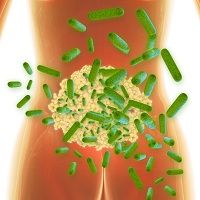Diet Reduces Gut Microbial Makeup over Generations
Generation after generation, a low fiber diet can contribute to irreversible depletion of gut bacteria, reported findings published in the journal Nature.

Generation after generation, a low fiber diet can contribute to irreversible depletion of gut bacteria, reported findings published in the journal Nature.
Researchers from Stanford University Medical Center used young mice models that were fed a strict diet to track microbiome development.
The mice were bred and raised in clean environments so that their intestines did not have any microbial bacteria. Human gut bacteria were subsequently transferred into the mice and they were divided into two groups. Half of the mice were fed a diet mostly made up of plant-derived fiber and the other half were given a diet of protein, fat, and calories and was considered devoid of any fiber.
“Within a couple of weeks, we saw a massive change,” senior author Justin Sonnenburg, PhD, explained in a press release. “The low fiber intake mice harbored fewer bacterial species in their gut.”
The study showed that more than half of the bacteria populations were reduced by more than 75% and many bacteria species seemed to have vanished completely.
After undergoing seven weeks of observation, the low fiber mice were changed to a high fiber diet for four additional weeks. The mice’s guts partially recovered, but the researchers found that only one third of the original bacteria species never fully recovered.
These effects were seen over time, and mice were only exposed to microbes through contact with their parents, as they were raised in clean environments. By the fourth generation of the experimental mice, the researchers found only just three-fourths of the bacterial species found in the guts of the first generation. When the fourth generation was reintroduced by the high fiber diet, the researchers determined that about two-thirds of the bacteria lost - over time - were unable to be restored.
However, some of the bacteria were restored after the researchers tried a more aggressive rebound method: fecal transplantation. When the fecal contents of the fourth generation high fiber diet mice were introduced to the fourth generation mice of the low fiber diet group (plus a two week long high fiber diet), their gut microbes were fully restored.
The researchers were unable to see significant differences between those mice and control mice’s gut microbial makeup after 10 days of the fecal transplant procedure.
“We would have difficulty living without them,” Sonnenburg said of gut microbacteria. “They fend off pathogens, train our immune systems and even guide the development of our tissues.”